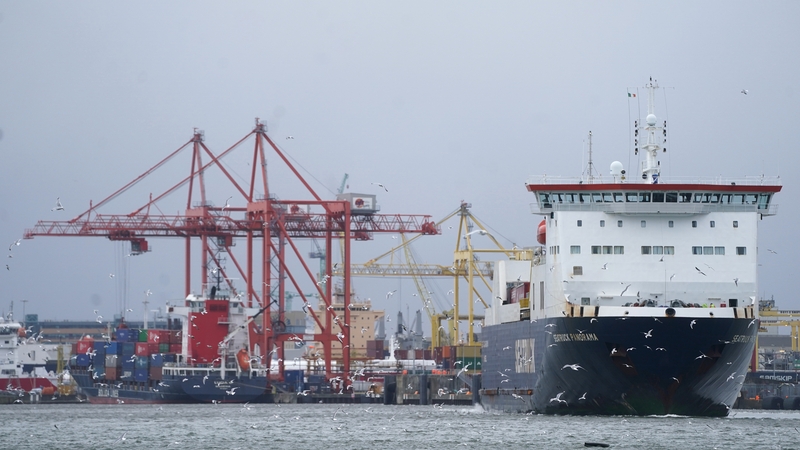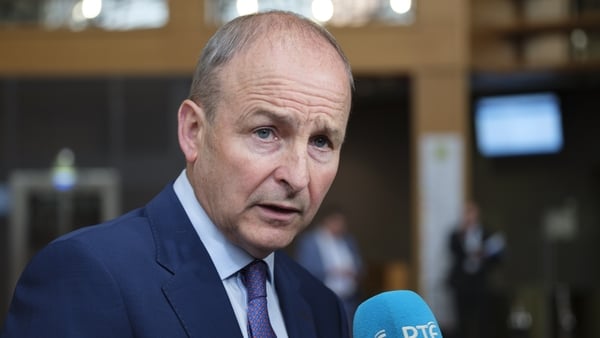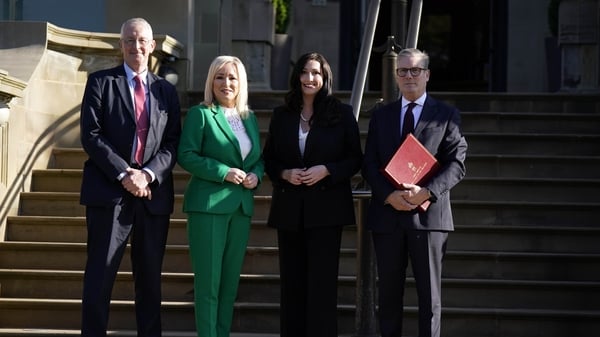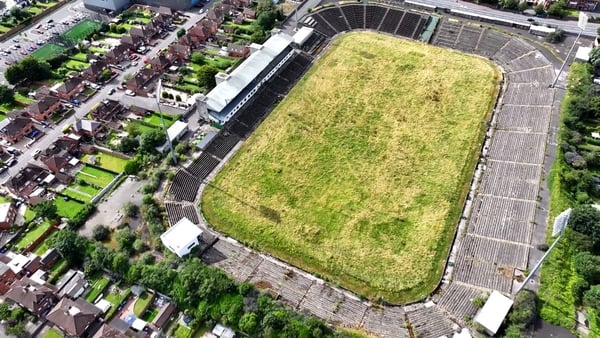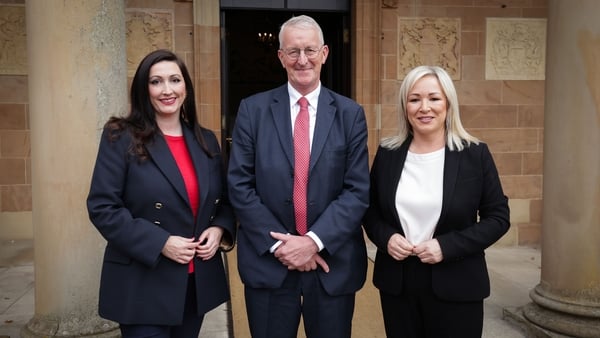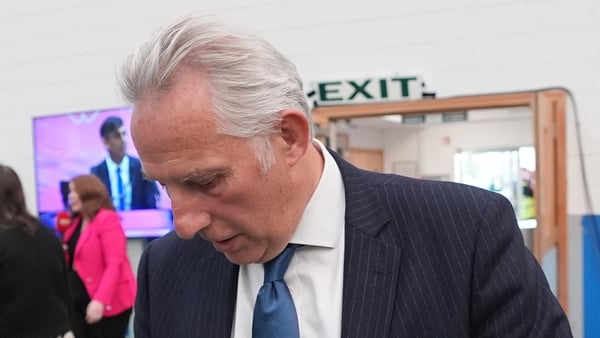Routine post-Brexit checks on goods shipped from Britain to final destinations in Northern Ireland are to be removed as part of a deal between the DUP and the British government to restore powersharing at Stormont.
A command paper titled "Safeguarding The Union" was published earlier and it is designed to ease concerns over Northern Ireland's post-Brexit status, saying the new arrangements would ensure unfettered trade between Northern Ireland and Britain.
The paper commits to replacing the green lane, which currently requires a percentage of goods to be checked, with a "UK internal market system" that will govern the movement of goods that will remain within the UK.
The paper said that would ensure there will be "no checks when goods move within the UK internal market system save those conducted by UK authorities as part of a risk-based or intelligence-led approach to tackle criminality, abuse of the scheme, smuggling and disease risks".
The paper adds: "This will ensure the smooth flow of goods that are moving within the UK internal market."
The red lane for transporting goods from Britain to Northern Ireland and on into the EU Single Market will remain, but the command paper offers measures aimed at reducing the volume of trade required to use that red-tape heavy route.
The move to reduce post-Brexit checks on GB-NI trade would represent a change to the current EU/UK Windsor Framework agreement and therefore would require Brussels approval.
It is understood decisions on implementing the changes are expected to be examined within the existing EU/UK joint committee framework in the time ahead.
We need your consent to load this rte-player contentWe use rte-player to manage extra content that can set cookies on your device and collect data about your activity. Please review their details and accept them to load the content.Manage Preferences
'Significant' changes to Windsor Framework - UK govt
Downing Street said that the deal with the DUP contains "significant" changes to the Windsor Framework's operation.
Prime Minister Rishi Sunak's official spokesman said: "This is our negotiation between the UK and the DUP, this is not about altering the fundamentals of the Windsor Framework.
"We do believe the changes we are implementing are significant and the DUP have made similar comments."
Pressed on the "significant" changes, he said that they were to the "operation of the framework".
He declined to say whether talks have been held with the EU, saying he would not discuss "private conversations".
He added: "It's important to make clear that this was a negotiation between the UK and the DUP about ensuring the framework operates properly within the UK."
This afternoon, Mr Sunak told the House of Commons that restored powersharing in Northern Ireland offered the prospect of a "brighter future".
Brake 'tested' in first month - Donaldson
DUP leader Jeffrey Donaldson said the Stormont brake mechanism would be tested within the first month of the formation of a new assembly.
He said: "On the application of the Stormont brake. The Command Paper published today will say that this will be tested within the first month of the assembly sitting.
"We will know very quickly because we know there are some changes to EU law coming down the track.
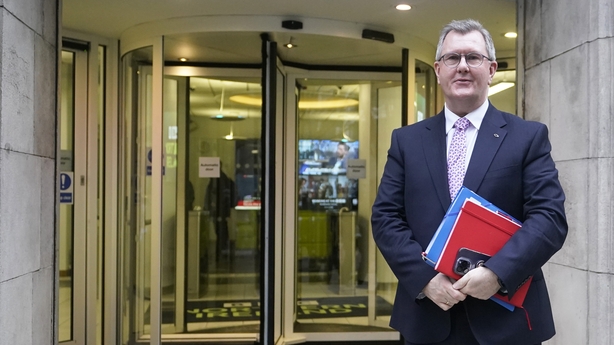
"There will be an opportunity for the assembly to look at that and the assembly can pull the brake at that point and say no, we think this EU regulation is harmful to our ability to trade with the rest of the UK.
"That opens up a process whereby ultimately the UK government can veto the application of that EU law if it is harmful to Northern Ireland.
"The government have agreed with us that those arrangements would be tested in the first month of the assembly."
Unionist and loyalist critics of the deal, who have described it as a sell out and betrayal, will seek evidence to support their analysis.
However, the DUP leadership team appears confident that it will stand up to scrutiny, with Mr Donaldson yesterday going as far to say the agreement will "exceed the expectations of many".
Read more:
Live: Updates as they happen
Post-Brexit checks on goods between NI and Britain set to end
Concerns remain as DUP champions deal with UK government
Northern Ireland Secretary of State Chris Heaton-Harris confirmed that a £3.3 billion package will be made available to the new executive, but all of the parties who will be involved have said that is not enough.
Legislation promised in the deal is set to be fast-tracked through UK parliament tomorrow to enable the swift restoration of the institutions at Stormont.
The command paper also includes commitments to ensure Northern Ireland goods will always be able to be sold in the British market regardless of any divergence in EU and UK standards.
In respect of further UK divergence from EU standards, there is also a legal requirement that new Westminster legislation is assessed as to whether it "impacts on trade between Northern Ireland and Great Britain".
If it does, there will be a statutory duty for the relevant minister to make a statement "considering any impacts on the operation of Northern Ireland's place in the UK's internal market".
A requirement that saw certain goods sold in Northern Ireland to display a label stating "not for sale in the EU" will now to extend to cover the whole UK.
The British government is also creating two new bodies. A UK East-West Council will bring together representatives from government, business and the education sector from Northern Ireland and Britain to "identify opportunities for deepening connections between Northern Ireland and the rest of the UK in areas such as trade, transport, education and culture".
Intertrade UK will promote trade within the UK. Among its roles will be to proactively communicate with businesses that currently choose not to sell products in Northern Ireland and identify solutions that could enable them to expand their services to the region.
We need your consent to load this rte-player contentWe use rte-player to manage extra content that can set cookies on your device and collect data about your activity. Please review their details and accept them to load the content.Manage Preferences
Šefčovič says he will 'carefully analyse' UK texts
European Commission Vice-President Maros Šefčovič will "carefully analyse" the UK texts on restoring Stormont, according to a joint EU-UK statement.
Mr Šefčovič held a phone call with his opposite number British Foreign Secretary David Cameron. The statement said that both men reaffirmed their "shared commitment to the full implementation of the Windsor Framework".
Earlier the Commission vice president spoke by phone to Mr Heaton-Harris.
According to the statement, Mr Šefčovič and Mr Cameron "both agreed on the high importance of seeing the Northern Ireland Executive restored and delivering for the people of Northern Ireland".
It said that Mr Cameron had explained the package of measures that were set out in the House of Commons earlier.
"The Executive Vice-President noted that the Commission will analyse carefully the texts published today," the statement said.
According to the statement, both men discussed the proposed joint EU-UK solution on Tariff Rate Quotas which would be considered at the next meeting of the EU-UK Joint Committee after completion of relevant procedures on both sides.
"This would deliver benefits for Northern Ireland importers and was another demonstration of the positive outcomes constructive joint working could achieve," the statement said.
It added: "This reflected their shared commitment to the full implementation of the Windsor Framework.
"The Commission will continue to exchange with the UK through the channels set up by that Framework."
Taoiseach does not 'see any red flags'
The Taoiseach has said that he does not "see any red flags" in terms of the British command paper allowing for the return of Stormont in Northern Ireland.
Speaking to RTÉ News in Brussels, the Taoiseach said while officials still need to study the plan and more questions may need to be answered, he does not see anything in it "that would give us undue cause for concern".
Asked about the plan, Mr Varadkar said: "I suppose we've only really seen the detail today, we're going to have to study it.
"I think there are certainly going to be some questions we will want to ask, more particularly the European Commission will want to ask on the trading arrangements.
"But from what I've seen so far I don't see any red flags that would give us undue cause for concern. But as I say we will want to study it further and certainly there will be more questions."
Asked if he believes the plan is compatible with the Windsor Framework which is also key to the wider Brexit EU-UK issue, Mr Varadkar said: "Well I think for us what's important is that everything is faithful to the Good Friday Agreement, that ensures there is no hard border between north and south and I'm confident that is the case.
"And it also needs to be faithful to the Windsor Framework which has been agreed between the European Union and the United Kingdom."
European Commission to consider paper - Martin
Tánaiste and Minister for Foreign Affairs Micheal Martin said he believed that Brussels would have a role in approving the changes.
"I think the EU Commission will look at this," he told reporters after meeting political leaders in Belfast.
"I think that's the whole purpose of the Joint Committee and indeed the various mechanisms that are in the Windsor Framework is to go through issues as they arise.
"But I do not anticipate any particular difficulties in respect of the EU side."
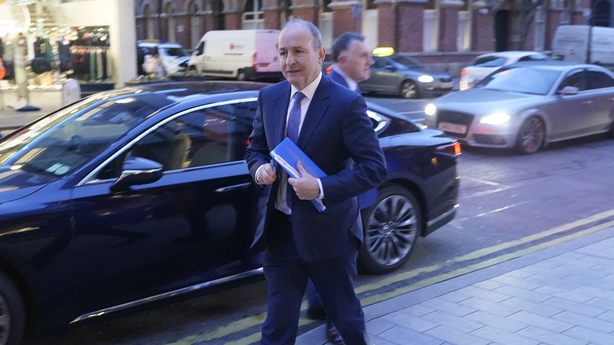
Mr Martin said that advocacy from unionism has "paid dividends" in changing post-Brexit trade arrangements.
"In many ways, the Windsor Framework was a significant advance on the protocol and what had been there from unionist perspective, and I would say that advocacy for unionism paid dividends and respect to the Windsor Framework and, indeed, on other issues as well in respect of the trading arrangements.
"Because, let's face it, and I've always said this: many elements of Windsor, people were told couldn't happen, and it did happen."
He added: "I do sense from talking to political parties that there is a recognition and the realisation that this is a moment in time now when the restoration of the assembly and executive must lead to a sustainable restoration, must lead to focus on the issues that matter to the people of Northern Ireland.
Assembly could meet on Saturday
Discussions will focus on the next steps in the process to restore powersharing.
Members of the assembly have been put on standby to attend a meeting at short notice - possibly as early as Saturday - to elect a new speaker.
That would be followed by the appointment of a first and deputy first minister and other members of a new executive.
A message from current Speaker Alex Maskey is advising MLAs that a sitting of the assembly may have to be arranged "at the earliest opportunity".
Earlier, First Minister Designate Michelle O'Neill, of Sinn Féin, said there is "understanding" that the Stormont Assembly will meet to appoint first and deputy first ministers and other executive members on Saturday.
Sinn Féin has said it will raise the need to resume meetings of the North-South Ministerial Council, which brings together ministers from Stormont and the Irish Government, as soon as possible.
The DUP also boycotted cross-border bodies as part of its protest at post-Brexit trade arrangements.
That boycott is also coming to an end.
Additional reporting Reuters, PA, Tony Connelly, Fiachra Ó Cionnaith
